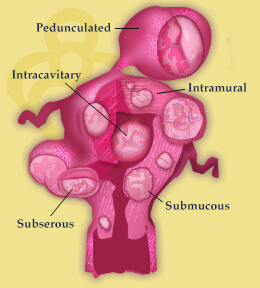Uterine fibroids are benign, non-cancerous tumors of the uterine muscle wall that can cause abnormal uterine bleeding
Fibroids, also known as leiomyomas or myomas, are extremely common. But despite their prevalence, many patients have a lot of misconceptions about what they are. Uterine fibroids are non-cancerous tumors that develop from the smooth muscular tissue of the uterus. A single cell reproduces repeatedly, eventually creating a pale, firm, rubbery mass. Fibroids can be microscopic or larger than a grapefruit.
Fibroids are one of the most common benign gynecologic tumors and are thought to affect up to three-fourths of all women at some point in their lives, but most are unaware of them because they often cause no symptoms. However, many women face problems with prolonged or heavy periods that interfere with their daily living due to fibroids. Fibroids can also affect the ability to conceive or keep a pregnancy.
The fibroid location dictates how they are classified, the symptoms they may cause and how they can be treated.
 Intracavity myomas – these fibroids are found inside the cavity of the uterus and usually cause bleeding between periods and often cause severe cramping. Fortunately, these fibroids can usually be easily removed by hysteroscopy, a minimally-invasive surgical method.
Intracavity myomas – these fibroids are found inside the cavity of the uterus and usually cause bleeding between periods and often cause severe cramping. Fortunately, these fibroids can usually be easily removed by hysteroscopy, a minimally-invasive surgical method.
Submucous myomas – these fibroids are partially in the cavity and partially in the wall of the uterus. They too can cause heavy menstrual periods as well as bleeding between periods. They can also interfere with the implantation of an embryo. Some of these can also be removed by hysteroscopic resection.
Intramural myomas – these fibroids occur in the wall of the uterus and can range in size from microscopic to larger than a grapefruit. Many of these do not cause problems unless they become quite large. There are a number of alternatives for treating these, but often they do not need any treatment at all.
Subserous myomas – these fibroids occur on the outside wall of the uterus and may even be connected to the uterus by a stalk (pedunculated). These do not need treatment unless they grow large, but those on a stalk can twist and cause pain. Sometimes these should be removed for patients with infertility going through IVF.


